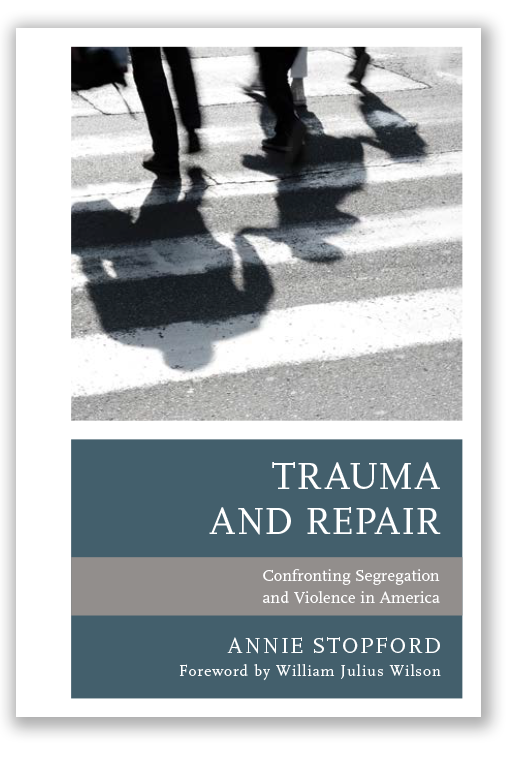Annie Stopford Ph.D - Scholar and Researcher - Publications
Annie Stopford is a psychotherapist, scholar, and researcher. Her latest book is Trauma and Repair: Confronting Segregation and Violence in America.

Trauma and Repair: Confronting Segregation and Violence in America 2020.
Trauma and Repair: Confronting segregation and violence in America is an interview-based interdisciplinary exploration of complex trauma in low-income communities and neighborhoods in Baltimore, Maryland; Oakland, California; New Orleans, Louisiana; and Elaine, Arkansas. Moving fluidly between the respondents’ life narratives and clinical and academic perspectives on trauma and inequality, The book examines multidimensional and intergenerational trauma, including prolonged economic injustice and repeated exposure to community violence. Written in an accessible and engaging style that draws on insights from sociology, public health, history, legal studies, and clinical psychoanalysis, this original study is a vital addition to the literature on inequality and poverty in the United States.
Editorial Reviews of Trauma and Repair: Confronting Segregation and Violence in America 2020.
Stopford provides a sometimes stark, oftentimes heart-breaking, and consistently informative ‘eyes wide open’ look at the consequences of community violence and racial segregation in the US. It is likely tempting for some to consider segregation in this country a thing of the past. But, as this author so clearly shows, segregation still comes in all shapes and sizes and involves much more than physical barriers or written policies. This book is not—nor should it be—an easy read. But Stopford employs a toolkit of psychological and sociological observations with adeptness and clarity to reveal the clinical and sociological impacts of marginalization, trauma, violence, and economic disparity. The narratives shared by Stopford’s respondents are rich and moving, revealing lived experiences in Baltimore, Maryland; Oakland, California; New Orleans, Louisiana; and Elaine, Arkansas. These are presented as real narratives—not “general” but instead, and more importantly, unvarnished and pure. Stopford’s use of this technique offers readers a clear foray into past injustice and a realistic assessment of current injustice, allowing her to show not only what needs to be done to end such systemic trauma in the present but also how we might begin to repair the damage already done. A must read for students, instructors, and all others, across the board! Highly recommended.
Choice Reviews
A consummate interviewer, antiracist activist, interdisciplinary scholar, and psychoanalytic clinician, Annie Stopford “gets proximate” with the people whose stories are told in these extraordinary chapters. Boldly confronting the collective disavowals and denials of those of us who live more privileged lives, Stopford’s chapters make painfully clear that the conditions that pass for normal in our segregated and deeply racist society are worse than abnormal: they are immoral and pathological. Still, we are awed by the people we meet here, who have all somehow managed creatively to sustain their humanity and love of community while living and working in traumatizing conditions of historical, structural, and community violence. This book is a must-read for anyone who cares to know what it takes to repair our broken social world.
Lynne Layton, Harvard Medical School; author of Toward a Social Psychoanalysis: Character, Culture and Normative Unconscious Processes
Annie Stopford’s work, Trauma and Repair, is profoundly moving, informative, and honest. She refuses to appease America’s appetite for euphemistic portrayals of those trapped through the generational legacy of historical trauma by giving voice to those who live on the other side of the “privileged wall” of society. Instead of more intellectual discourse explaining “their” situation, Stopford uses her clinical sensibilities to engage those trapped on the lesser side of that “wall” to express their own life narrative in the hope of building blocks to address the issue of racial injustice.
Annie Stopford is notable for the clear voice she brings to speaking about subjects many others have turned away from knowing. In this latest work, Dr. Stopford once again leans into the meanings within the stories her interlocutors relate—in her hands, these lived histories of marginalization and trauma become painfully vivid. Her telling joins skillful listening with multiple disciplines as historian, psychoanalytic psychotherapist, and analyst of class, race and economics. We are offered a rare opportunity to learn the lessons from past injustices that continue to play out in contemporary life. Were we to learn them we might potentiate the opportunity for healing from centuries of racial injury and economic betrayal.
Nina K. Thomas, New York University

Further publications
Baltimore past and present: The violent state of segregation. With Gardnel Carter. In J. Adlam, J. Gilligan, T. Kluttig, B.X. Lee & J.L. Young (eds) Violent States and Creative States. London: Jessica Kingsley Publishers, 2018, 71-86.
There’s no trust at all, in anything: Psychosocial perspectives on trauma in a distressed African American neighborhood. In O’Loughlin, M. & Charles, M. (Eds.) Fragments of Trauma and the Social Production of Suffering. Lanham, MD: Rowman & Littlefield, 2014, 221-242
Cambodia’s suffering: Reflections on two journeys to a “broken society”. Psychoanalysis, Culture and Society, 2011, Vol. 16, Issue 2, 209 -217
Leaving “home”: The challenges of living with radical cultural difference. Contemporary Psychoanalysis, Oct. 2009, 45 (4) 444-466.
Mothering children of African descent: Hopes, fears and strategies of white birth mothers. Journal of Pan African Studies, Nov. 2007 Vol. 2 No 1
http://www.jpanafrican.com/docs/vol2no1/MotheringChildrenOfAfricanDescent.pdf
Psychoanalysis and interraciality: Asking different questions. Psychoanalysis, Culture and Society, Sept 2007, Vol. 12, Issue 3, 205-225.
Trans global families: The application of African conceptual and ethical systems to African-western relationships and families, Jenda: A Journal of Culture and African Women Studies, 2006, Issue 8.
Hold the cloth that absorbs tears: Migration, money and mutuality in African Australian relationships, Studies in Gender and Sexuality, 2006, Vol. 7, Number 1, 15 – 30.
Researching postcolonial subjectivities: The application of relational psychoanalysis to psycho-social research, The International Journal of Critical Psychology 2004, Issue 10, 13-35.

